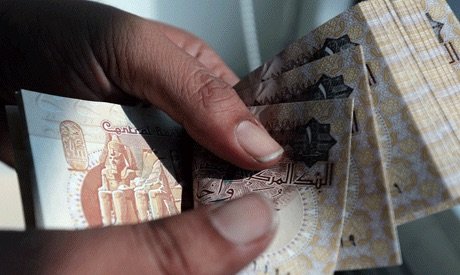Egypt's central bank left its key policy rates steady, as expected, confirming that rates are currently appropriate given the balance of risks and it "will not hesitate to adjust the key CBE rates to ensure price stability over the medium-term."
On Nov. 3 the Central Bank of Egypt (CBE) took financial markets by surprise by raising its policy rates by 300 basis points as part of a liberalization of its foreign exchange market.
The CBE has raised its rates, including the benchmark overnight deposit rate, by 550 points this year. The deposit rate is currently at 14.75 percent.
Economists had expected the CBE to retain its rates today while the impact of last month's decision to float the Egyptian pound on inflation becomes clearer.
Egypt's inflation rate jumped to 19.4 percent in November from 13.6 percent in October, with the central bank saying consumer prices were "strongly impacted" by the liberalization of the foreign exchange market as well as changes to hydrocarbon subsidies.
In addition to higher regulated prices, higher food and retail prices pushed up inflation in November and the core inflation rate rose to 20.73 percent from 15.72 percent.
The Egyptian pound strengthened in response to the central bank's decision today to 18.25 a U.S. dollar from around 19.3. But compared with a rate of 8.88 on the day before the pound was liberalized, the pound is down 51 percent.
In March the CBE devalued the pound by almost 14 percent, to 8.95 per U.S. dollar so it has depreciated by 57 percent since the start of this year.
"Looking ahead, annual inflation is expected to narrow after being impacted by transitory cost-push factors stemming from the economic reform measures," the CBE said, adding it had acted preemptively on Nov. 3 in anticipation of the inflationary pressures.
Egypt's economy was hard hit by the uprising in 2011, which dented tourism and foreign investors, leading to a shortage of foreign exchange.
The economy grew by 4.3 percent in the first quarter of this year from the previous quarter while the unemployment rate rose to 12.6 percent in the third quarter from 12.5 percent in the second quarter.
Last month the International Monetary Fund (IMF) approved a three-year, $12 billion financing arrangement to help Egypt with its economic reforms, saying the exchange rate liberalization and pound devaluation were "critical steps toward restoring confidence in the economy and eliminating foreign exchange shortages."
"The new exchange rate regime will be supported by prudently tight monetary policy to anchor inflation expectations, contain domestic and external demand pressures, and allow accumulation of foreign exchange reserves," the IMF said.
The IMF has forecast economic growth in the 2016/17 financial year, which ends June 30, of 4.0 percent, up from an estimated 3.8 percent for the 2015/16 year.
Inflation is seen averaging 18.2 percent in the current financial year, up from 10.2 percent in 2015/16, with inflation ending at 16.6 percent by June 2017.





































